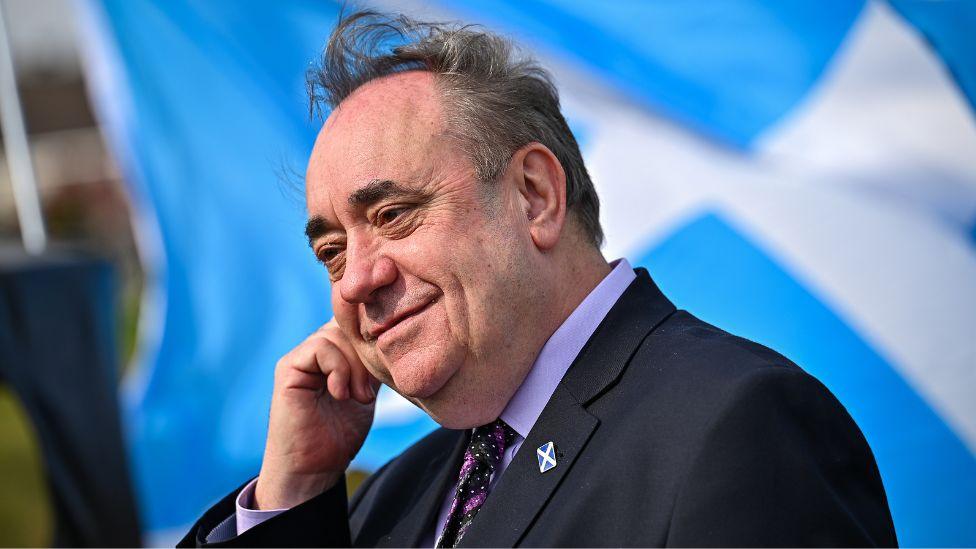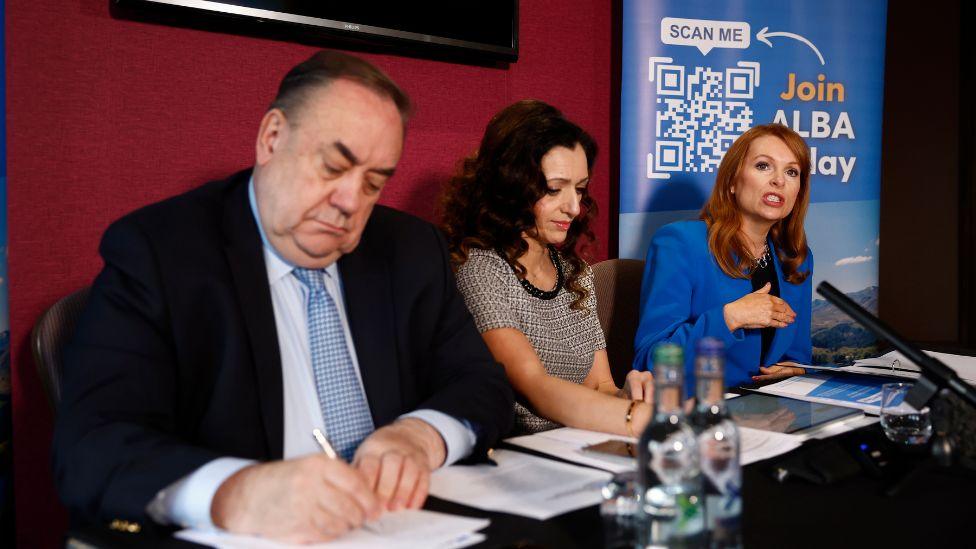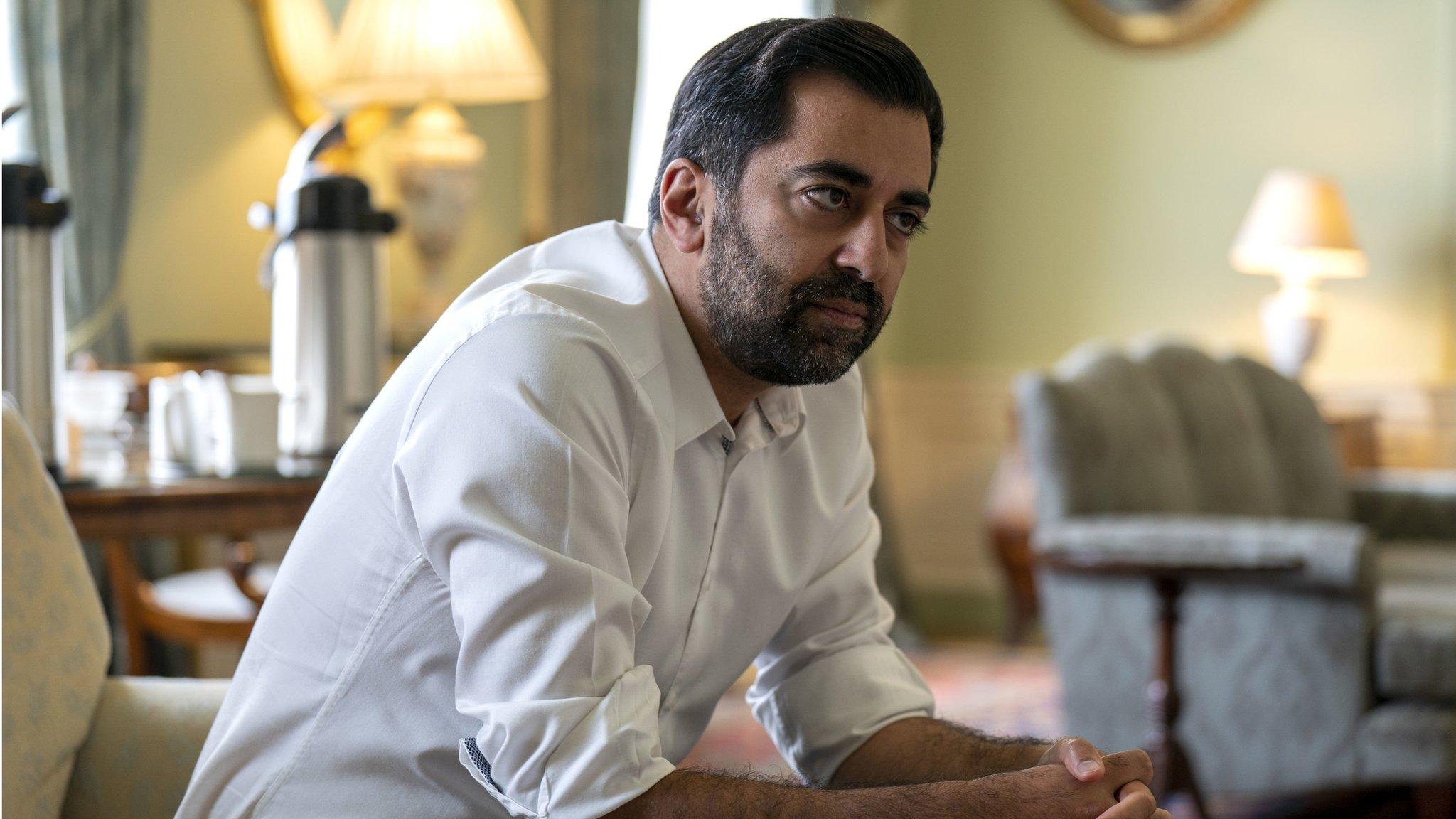Alex Salmond launches new Scottish independence plan
- Published

Former first minister Alex Salmond says the new strategy could provide a 'democratic double whammy'
Alex Salmond's Alba Party is to draw up legislation for a referendum about Scottish independence.
The former first minister wants to hold a vote next year on the 10th anniversary of the 2014 ballot.
Scots would be asked whether Holyrood should have the power to trigger independence talks.
The proposals are to be set out in a members bill submitted by MSP Ash Regan, who recently defected to Alba from the SNP.
The UK government has repeatedly refused to give formal consent for another referendum, and won a Supreme Court case last year that found Holyrood could not legislate for a vote without that consent being in place.
Conservative, Labour and Liberal Democrat MSPs have all dismissed arguments for a second referendum, arguing the government should focus on other issues such as the cost of living crisis.
Alba argued it could get around the Supreme Court ruling with Ms Regan's bill seeking to force a referendum that would ask voters whether the Scottish Parliament's powers should be extended to allow it to legislate for and negotiate independence.
Alba would then seek to secure a mandate at an election with more than 50% of the votes for pro-independence parties.
The party's leader, Mr Salmond, is currently taking legal action against the Scottish government.
Ms Regan said: "Last year's ill-fated expedition to the Supreme Court has halted the opportunity to propose an independence referendum in the Scottish Parliament.
"However, there is nothing to stop our parliament proposing a referendum which we believe would be within competence."
She added: "That is what my proposed new draft bill does, and I intend to canvass public and parliamentary support for it now. It is time for the independence movement to offer our supporters the real prospect of progress."

Alba party leader Alex Salmond, chairwoman Tasmina Ahmed-Sheikh and MSP Ash Regan launched the strategy at a press conference in Edinburgh
After the consultation phase ends, the members' bill would have to gain the support of at least 18 MSPs before it could progress further.
To pass, it would then likely need the support from Ms Regan's former SNP colleagues and their government partners the Greens.
However, she told a a press conference in Edinburgh that there may be other "democrats" in the parliament who "perhaps don't favour independence, but they still think that it's democratically right for Scotland to have that choice over their own future".
Ms Regan told reporters it would be challenging to progress her members bill in less than a year to meet the aim of holding a referendum on 18 October 2024, but insisted it was a "sensible and credible approach".
'Democratic double whammy'
She said that parliament's non-government bills unit, which provides support to MSPs, was "at capacity" and that Alba would be drafting the bill itself.
The MSP, who was a candidate for the SNP leadership when Nicola Sturgeon quit earlier this year, said the strategy would be a "companion initiative" to gain more than 50% support for pro-independence parties at an election.
Mr Salmond explained the public would be asked in a referendum if they agreed Holyrood's power should be extended "to include the negotiation of and legislation for Scottish independence".
The former SNP leader said he would then seek an election result to give "instruction" to that, describing it as a "democratic double whammy".
He said the current plan is "exactly the sort of initiative" he would have opted for if then prime minister David Cameron had refused to allow a referendum in 2014.
Mr Salmond took the government to court in 2019 over its mishandling of harassment complaints against him. Last week, he lodged a Court of Session petition alleging misfeasance - the wrongful exercise of lawful authority - by civil servants. The former SNP leader was cleared of sexual assault charges in a separate criminal trial in 2020.
It was put to Mr Salmond that gaining support for the bill from the SNP could be made more difficult by his legal action against the SNP-led government. He replied: "I'm not suing the SNP, not yet anyway. I'm suing the Scottish government."
The former first minister added: "You don't have to agree with people or even like them to co-operate politically."
An SNP spokesperson said: "We consider member's bills as and when they come forward, but there are no shortcuts to independence.
"That' is why the SNP is focused on winning the argument and building the case amongst the people of Scotland, and support for independence continues to be around 50% or higher."
They added that the party agreed at its autumn conference that "page 1, line 1" of its manifesto at the next general election will read "vote SNP for Scotland to become an independent country".


It's just over a year since the Supreme Court put the brakes on Nicola Sturgeon's plans for an independence referendum.
Her successor Humza Yousaf has continued her strategy of pushing the issue through elections, but it's her predecessor who thinks he's found a way around the court's ruling.
Alex Salmond wants to hold a referendum essentially paving the way for a de-facto referendum - a vote which would give MSPs the power to declare independence following a future election.
Whether that happens or not, there are a number of advantages to this for Mr Salmond. It keeps the constitution at the forefront of the debate, it puts pressure on SNP MSPs to back him, and it keeps his Alba Party relevant.
On the flip side, it all still hinges on backing from Westminster. UK ministers would need to agree to come to the table, whether that's in response to this referendum or to a pro-election majority in an election.
And the biggest issue is that this plan - like Alba's Scotland United strategy - needs the support of the SNP to go anywhere. It needs votes from members of the governing parties to get through Holyrood.
And as long as Mr Salmond is chasing the government he used to lead through the courts, that seems distinctly unlikely.
- Published15 October 2023
